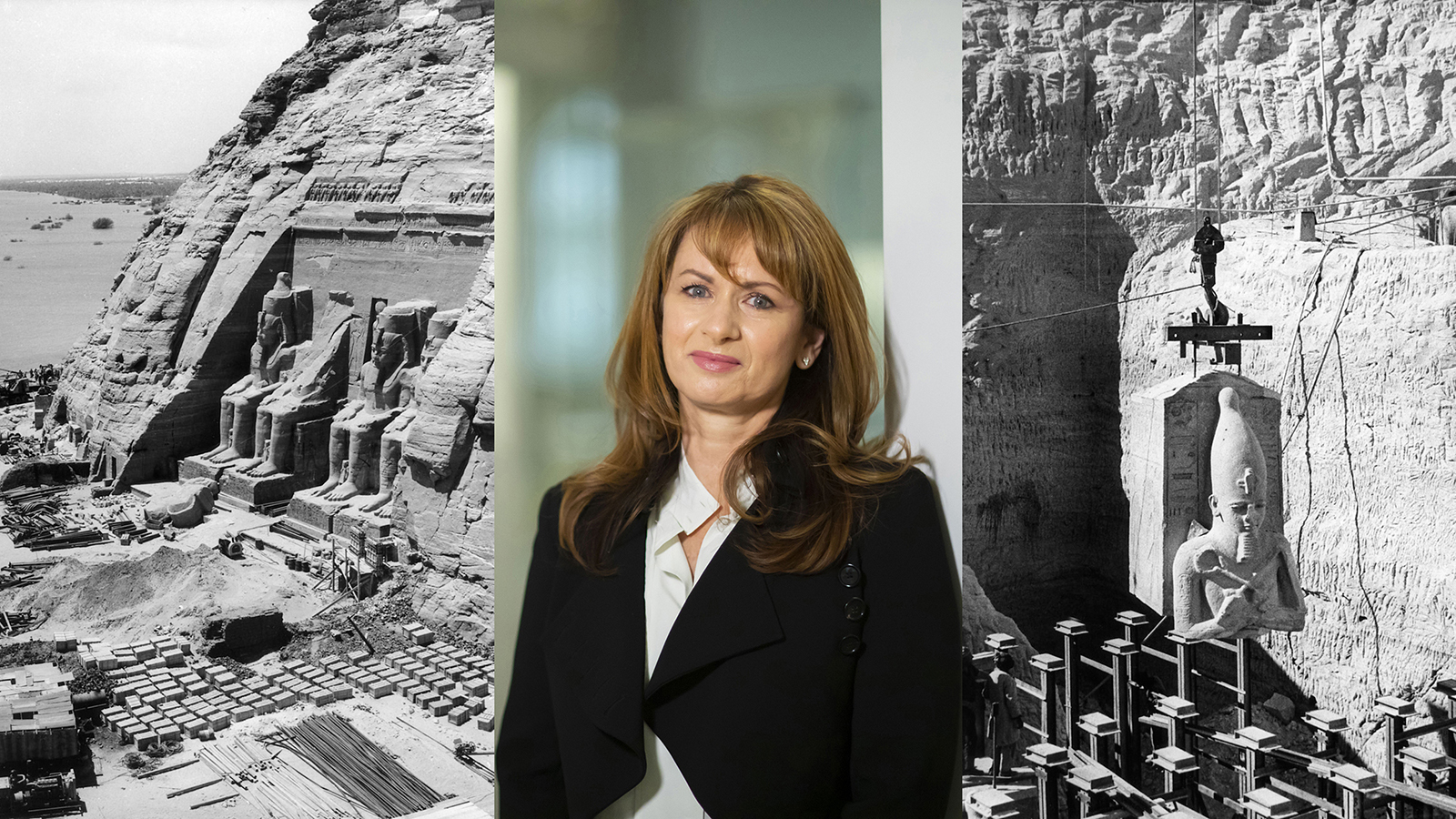Lynn Meskell – Engineering Internationalism: Colonialism, the Cold War, and UNESCO’s Victory in Nubia

Center: Lynn Meskell (photograph by Eric Sucar); left and right: UNESCO’s Nubian Monuments Campaign, Abu Simbel (photographs courtesy of Wikimedia Commons)
Lecture 1
November 29
Imperialism, Internationalism, and Archaeology in the Un/Making of the Middle East
American Academy in Rome
6:00pm
Lecture 2
December 1
A Tale of Two Cities: The Fate of Delhi as UNESCO World Heritage
British School at Rome
6:00pm
Lecture 3
December 7
Engineering Internationalism: Colonialism, the Cold War, and UNESCO’s Victory in Nubia
American Academy in Rome
6:00pm
The Thomas Spencer Jerome Lecture Series is among the most prestigious international platforms for the presentation of new work on Roman history and culture. The Jerome Lectures are presented at both the American Academy in Rome and the University of Michigan. In 2021, the forty-eighth year of the lecture series, Lynn Meskell (2015 Resident), Penn Integrates Knowledge Professor in the School of Arts and Sciences and Professor of Historic Preservation in the Weitzman School of Design at the University of Pennsylvania, will discuss the ethics of global heritage and archaeology.
This series, entitled The Ethics of Heritage and Archaeology in Global Perspective, addresses the role of archaeology and heritage within international networks of social and political change from the legacies of colonialism, to Cold War tensions, to the era of neoliberalism. The lectures reveal how the discovery and salvage of sites worldwide has mobilized government, military, and corporate interests, in what Meskell describes as a form of archaeological adventurism. Employing case studies from the Middle East, India, and Europe, Meskell attempts to uncover the dense network of social, political, and economic agendas that are at play in preserving the past.
The first lecture, held on November 29, is entitled Imperialism, Internationalism, and Archaeology in the Un/Making of the Middle East. Archaeological materialities and imaginaries have been deeply entwined with both colonial rivalries and struggles for self-determination that continue to have lasting legacies. Neo-imperial ambitions in the Middle East and conflict over territory, religion, oil, and antiquities have similarly been accompanied by heritage claims. Throughout the twentieth century, foreign occupation and military conflict galvanized archaeological elites.
The second lecture, A Tale of Two Cities: The Fate of Delhi as UNESCO World Heritage, takes place on December 1. In June 2015, a nomination dossier entitled “Delhi’s Imperial Capital Cities,” combining the two imperial capitals of Shahjahanabad and New Delhi, was proposed for the UNESCO World Heritage List. In this lecture, Meskell traces the trajectory of the dossier and events surrounding its withdrawal to reveal the political imbrications of urban conservation, international institutions, neoliberal governance, and colonial histories. She situates Delhi’s heritage within the ambit of neoliberal governance that recalibrates and promotes urban heritage preservation, while similarly encouraging development and economic growth. The episode reveals tensions in this specific political moment over contemporary perceptions of imperial occupation and “foreign” empires, which plagued the dossier from the outset and continue to reverberate in India today. (This lecture will be held at the British School at Rome.)
The final Jerome lecture, on December 7, is entitled Engineering Internationalism: Colonialism, the Cold War, and UNESCO’s Victory in Nubia. Much has been written about UNESCO’s Nubian Campaign, from the heroism and humanism promoted by the agency’s own vast propaganda machine, to the competing narratives of national saviors whether the French or Americans, to Nubia as a theater for the Cold War, down to individual accounts by technocrats, bureaucrats, and archaeologists. What crystallized in UNESCO’s midcentury mission in Nubia was a material attempt to overcome the fissures that were already appearing in their postwar dream of a global peace.
Lynn Meskell was the 2015 American Academy in Rome Scholar in Residence and is currently PIK Professor of Anthropology in the School of Arts and Sciences and Professor of Historic Preservation in the Weitzman School of Design. At the Penn Museum she is curator in the Middle East and Asia sections. She is currently AD White Professor-at-Large at Cornell University (2019–25). Over the last decade Meskell has conducted an institutional ethnography of UNESCO World Heritage, tracing the politics of governance and sovereignty and the subsequent implications for multilateral diplomacy, international conservation, and heritage rights. Employing archival and ethnographic analysis, her award-winning book A Future in Ruins: UNESCO, World Heritage, and the Dream of Peace (New York: Oxford University Press, 2018) reveals UNESCO’s early forays into a one-world archaeology and its later commitments to global heritage.
Thomas Spencer Jerome (1864–1914) was an American lawyer and a lover of Roman history who lived on Capri from 1899 until his death. In his will, Jerome endowed a series of lectures to be jointly administered by the University of Michigan and the American Academy in Rome, to be delivered at both institutions. The revised lectures are published by the University of Michigan Press.
All lectures will be given in English.
This event, to be presented in person at the Academy as well as on Zoom, is free and open to the public. Please register for Zoom in advance. After registering, you will receive a confirmation email containing information about joining the event.
The lecture series is co-organized with the British School at Rome.

Notice
Space in the Villa Aurelia is limited, and seats are available on a first-come, first-served basis. If you plan to attend an event with a group of over six guests or students, please inform events [at] aarome.org (events[at]aarome[dot]org) with at least 48 hours prior notice so that special arrangements can be made.
Guests will be asked to comply with Covid-19 safety protocols for events:
- Access to the Academy requires the presentation of a valid photo ID and a Super Green Pass
- Masks are required when indoors, and temperature will be checked before entry
- Visitor contact information may be shared for contact tracing
Please contact events [at] aarome.org (events[at]aarome[dot]org) with any questions.
Backpacks and luggage with dimensions larger than 40 x 35 x 15 cm (16 x 14 x 6 in.) are not permitted on the property. There are no locker facilities available.